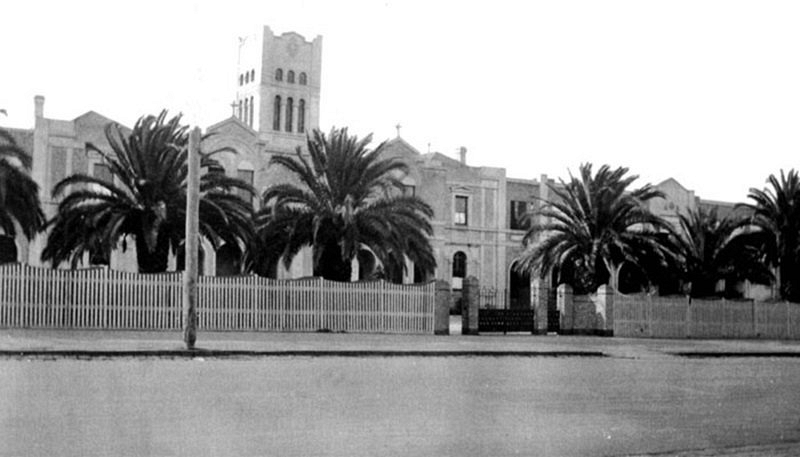He decided to take on the name, ‘Collings’, as a symbol of his new, independent identity...
Perfectly round pebbles
skipping over darkness
Beneath there is pain
THE BOYS' HOME was the most terrifying time for Charles Sydney Doherty. He was seven when his mother left him in the steel-like grip of a nun’s arms and walked off, without looking back. There were no parting pleasantries, no hugs or kisses — just a casual, “This is where you live now”, followed by a business-like exit.
Charles screamed and begged, but he knew it was futile — his mother’s heart had hardened long ago, deep in its core. Phyllis Doherty delivered her parting words to her son and proceeded out of view, an enormous iron gate clanging behind her. The nun dropped Charles without ceremony.
“Follow me,” she said. And Charles did.
That night in the dormitory, it was cold and dark and still, except for the soft whimpers that could be heard from distant beds. A dank, musty smell permeated the room and the sheets under his threadbare blanket were scratchy. Charles needed to go to the toilet but was petrified — motionless in bed. He had not been shown where the lavatory was and had been told that no one was to move after "lights out". To take his mind off his bursting bladder, Charles thought about the time he had followed a family to the beach. He remembered the warming sun beaming down on him and the silky feel of the water, cool on his skin. Without warning, he felt hot urine escape his body.
Shame overtook fear and Charles lay awake planning what to do. At first light, he changed his clothes and hid his wet underpants in his pocket. When he thought no one was looking, he disposed of them behind a thick bush in the institution grounds. Of course, his wet bedclothes were discovered. The consequences of this first night would stay with him and follow him through his nightmares.
Charles knew then, categorically and without hope of being mistaken, he was unloved. His mother had abandoned him. His father had never wanted to meet him. He was illegitimate. The nun had told him this after he had been deposited in her care, grimacing as she did so and hissing out the word as though it were a contagious infection. Although he wasn’t sure what illegitimate meant, he was sure it was linked to the fact that his world was one where survival was dependant on his devices — and his alone.
This came to him as an epiphany that first morning as he stood for hours on the "Detention Plate" after the bed-wetting infraction. This was the spot in the central courtyard where misbehaving boys were made to stand as punishment. From this vantage point, he was able to watch people beyond the gates of the towering institution on Cecil Street, South Melbourne — people who were free to go about their lives.
Although Phyllis visited a handful of times, there was never any hint that Charles would be allowed to go with her. He knew better than to question his mother’s words:
“This is where you live now."
It was a relief to stop relying on the help of others. Charles knew he was strong and he was quick-thinking but most importantly, he was steadfast. His goal was not only to be free, it was to be respected — he would become a man of standing. This premise became his mantra. He didn’t know where the idea came from, but once it had formed, he grabbed onto it and clung to it with all his strength, knowing it would save him.
Mr Collings was a little eccentric. He liked nothing better than to corner us if we were on our way to a party, sit us down and tell us stories. As the friends of his daughter, we would sit politely and nod, although the tales he told were as distant to us in our teens as the first fleet. While he rarely discussed personal feelings, he was an atheist and loved to share stories, where the moral was usually the importance of self-belief. He would register us squirming with impatience and disinterest, but continue anyway, often laughing heartily at his own jokes.
As much as the stories themselves, Mr Collings enjoyed an audience. He would happily discuss his views on religion, or philosophy with hapless Jehovah’s Witness or Mormon visitors, never giving in until they retreated, exhausted and defeated.
His stories were delivered like sermons and there was no getting out of hearing them. Every now and then he would ask a question and, invariably, I would be caught out not really listening. But the twinkle in his eye and his obvious glee in the delivery, was oddly appealing. He liked to shock and entertain but his recollections were truly fascinating and, to me at the time, incredible.
*****
Rolling stones
beyond the universe
And into infinity
At St Vincent de Paul Boys Orphanage, standing for hours on the Detention Plate was a common punishment for bed-wetters. They would be made to stand in full view of the playground, in the rain or blazing sun, as a deterrent to other would-be evil-doers.
Although he had not wet his bed since that first night, Charles had been moved to the "Bed-Wetters Dorm" – the most shameful dorm – in which infractions were many and redemption unlikely. Speaking during meal times, elbows on the table, or being unable to finish a meal (an unusual occurrence as meals were meagre), were among the many transgressions that would end in corporal punishment or a stint on the Detention Plate.
Charles learned to endure – and even thrive – from such experiences. He would count the people walking by and imagine their exotic lives, or set himself small goals, like practising the times tables. During beatings, which were often brutal, he would train his mind to focus on future goals. At play times, he would find a pebble – the rounder the better – and try to kick it a little further each time, to better his personal best. He imagined rolling with the pebble beyond the iron gates to a different life. He had no friends at the orphanage and spent most of his time retreating into his imagination, afraid even to speak to anyone.
Although most of the boys in the home were not delinquents, but orphaned or removed from neglectful or abusive parents, the institution was run with military precision and its inhabitants were treated more like prison inmates than children. They were marched around Albert Park Lake for hours at a time. They were awakened before dawn for prayer, lessons and gruelling chores. In the Bed-Wetters’ Dorm, the children were required to wash their own sheets, ring them out by hand and hang them to dry before making their own beds again. If this was not done to the satisfaction of the nuns, or brothers, the children were beaten and sent back to the Detention Plate.
Charles tried to be invisible. He did as he was told. He made himself small.
*****
Stones moving through water
like dead weeds
In sinking possibilities
About three years after depositing him there, Phyllis returned to the orphanage and took Charles with her to Tasmania. She had met a fisherman, known only as "Collings" and they were to live with him. The fisherman slept during the day and worked all night netting fish in Kanamaluka (the Tamar River). He took Charles with him to work, making him take the nets out into the water — often by himself, at night.
On one particular fishing trip, Collings stood Charles on a mud island. “You can swim back,” he said, as he left in the boat without explanation. The water was rising — Charles could not swim. He sat huddled in the middle of the island and tried not think about drowning. Many hours later, Phyllis arrived in Collings’ boat and rescued him. He wondered if there was a small pocket of love growing in her heart for him.
After a few months, Phyllis grew tired of rural Tasmania and returned to Melbourne, leaving Charles behind again. Charles did not ask questions. The answer cut too deep: there was no room for him in his mother’s heart, after all.
This is where he lived now.
Charles continued to work, dragging and hauling nets in the darkness. All the time, he reminded himself that he was strong and responsible for himself, and repeated his mantra: he would be a man of standing.
Perhaps a year or so later, a nearby couple threatened to tell the authorities Charles was not attending school. Collings responded by telling the neighbours to “take him then”.
Charles moved in with the Luttreges. Here, he was only expected to help with chores instead of working full time and he attended school. He was happier than he’d ever been. However, when Charles asked Mrs Luttrege if he could call her "Mum", she declined. His heart was smashed into little, tiny pieces. Despite this, the couple remained the kindliest adults of his childhood.
They also knew a lot about Charles’ family history. According to the Luttreges, Phyllis Doherty was born out of wedlock, as was her mother Amy, Charles’ grandmother. Amy Doherty was born to a maid who worked in a "noble" English household and had a dalliance with the son of the Lord. After her illegitimate child was discovered, the maid died in odd circumstances aboard a paddle steamer, which mysteriously exploded. There was speculation she had been murdered.
When Phyllis’ mother, Amy Doherty, married a respectable man with four children of his own, Phyllis, the product of an illegitimate liaison, was thrown out. This may have been after it was discovered she was pregnant with Charles.
Charles remembered standing on street corners as a small child and sleeping in different rooms, including at the Salvation Army Mission. It is likely that his mother, who was illiterate and unskilled, had become a prostitute — at least for part of his childhood.
Charles represented the third generation of Dohertys to be born out of wedlock and seemed destined to repeat the mistakes of his forebears. But Charles turned his attention to the fact he had a grandmother and possibly other relatives. He allowed the idea of family to enter his musings. He would become a man of standing and he would have a real family. His dreams took on colour and life, and occupied his waking thoughts.
*****
Mealtimes at the Collings house were always well-mannered affairs. The table was set with care and there were usually flowers and candles. Whether due to his early conditioning or a desire for refinement, Mr Collings insisted that there were no elbows on the table or speaking with one’s mouth full.
The children had to ask to leave the table in a particular way: I have had elegant sufficiency — may I be excused? This, along with a few other unusual insistences on etiquette, was indicative of the types of people Mr Collings wanted his children to become.
Mr Collings built his own family. He was strict on matters of respect, responsibility and good manners, but there was laughter and chatter and never any smacking. His children were valued; they were loved.
Pebbles taking shape
building walls of hope
And love
At around 15 years of age, Charles became an apprentice to a typewriter mechanic. Feeling shattered and alone after his rejection by the Luttreges, he was taken into the fold of a group of Seventh-day Adventists, where he joined in trying to convert others to their philosophy. The Adventists told him it was sinful to work on Saturdays — in their faith, the day of the Sabbath. When Charles explained to his boss he was unable to continue working on Saturdays, he was promptly fired and told he would “never be a mechanic”. He told his Adventist friends, expecting that they would help, but they didn't.
Charles decided to go to Melbourne to see his mother and possibly even find his father. The dream of family had grown in his heart. He prayed.
At the orphanage, one of the nuns had told him that his father was a Collins Street fruiterer, who paid for Charles to stay there. Although he did not know if this was true, Charles wandered the streets of Melbourne, speaking to all the fruit sellers, hoping to find his father.
Phyllis was now living with a new man and Charles was not welcomed. He struggled to find work, working only sporadically.
The Great Depression had hit Melbourne hard and Charles sunk into a deep depression of his own. Even God did not love him — he was alone and unlovable.
On a bare mattress in a dilapidated boarding house, the years spent kicking stones and imagining freedom stirred again in Charles’ mind. He was responsible for his own life. An idea he had long harboured began to develop: there was no God, only the power of the mind. This revelation grew in his mind and filled him with strength.
Charles dragged himself out of his melancholy. He eventually found work as a typewriter mechanic after many months subsisting on stale bread. He found lodgings in a respectable household and devoted himself to mastering his trade. The words of his boss – “You will never make a mechanic” – inspired in him a new and improved dedication.
He decided to take on the name "Collings", as a symbol of his new, independent identity — possibly because the fisherman was strong and self-sufficient.
He also reiterated his mantra.
He would be a man of standing.

This work is licensed under a Creative Commons Attribution-NonCommercial-NoDerivs 3.0 Australia License
Monthly Donation
Single Donation
I walked down Raglan St, South Melbourne. Only the orphanage's facade is still standing. Smash it all, I could still see the kid's ghosts.
— Alan Petridish (@Faustus_Socinus) January 22, 2014
You're not alone. Subscribe to IA.











